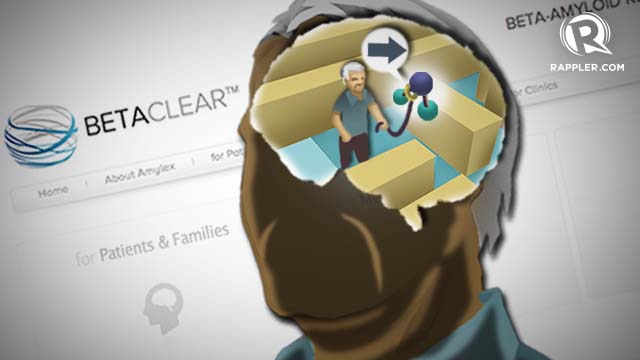SUMMARY
This is AI generated summarization, which may have errors. For context, always refer to the full article.

MANILA, Philippines – Cynthia Nazaire, a retired nurse, still vividly recalls what it was like caring for her mother who was diagnosed with early Alzheimer’s disease at the age of 82.
More than the expense, more than the extra effort, “what hurts most was when you saw her not remembering us,” said Cynthia.
“She would just stare at us. We had to put a name tag on us every time we saw her.”
While Cynthia’s mother, Erna, forgot the present, she lingered in the painful past.
“My mother at that time could not remember us at all. She would only remember the past like her experiences during World War II… She would wake up in the middle of the night shivering, perspiring heavily and so afraid that she would hide at the back of the curtain whispering that the Japanese will catch her.”
But it was Alzheimer’s disease that finally claimed her. In 2007, Erna died from the disease at the age of 87.

Erna and Cynthia’s story may resonate with millions of other people touched by Alzheimer’s disease. Though it is often seen as a natural effect of aging, studies tell us that it is not. Instead, Alzheimer’s is caused by an increasingly fatal build-up of a type of protein called beta amyloid in between brain cells. The beta amyloids form plaques that disrupt the connection and proper functioning of the cells.
Though numerous treatments have been developed to slow the progression of Alzheimer’s, none can yet stop the build-up of the Alzheimer’s-causing proteins.
But a pharmaceutical company says they’ve found a way to do just that.
New device
Amylex Pharmaceuticals, Inc., a US-based pharmaceutical company, claims to have developed a medical device that can stop the progression of Alzheimer’s disease.
Betaclear, the name they have given the device, uses nanomolecular science to reduce the proteins in the brain that cause Alzheimer’s disease. This approach distinguishes itself from previous treatments for Alzheimer’s such as neurostimulants, inhibitors and at one point, even a vaccine.
Because the device’s process of combating the disease is extracorporeal or takes place outside the body, Amylex claims that side effects are not likely, an improvement over previous treatments.
What’s more, Amylex has announced that Betaclear will originate in the Philippines, meaning that registration of the device and clinical trials to determine its efficacy will be done in the country.
Aside from giving Philippine residents with Alzheimer’s disease first access to the drug, the initial commercialization of the device in the Philippines can boost the country’s medical tourism past the billion-peso line.
Watch a video about Betaclear here:
Robot made of molecules
Betaclear is not a drug. It is a medical device in the same way that a crutch, pacemaker, stethoscope or Band-Aid are medical devices.
According to Amylex Philippines CEO Rogelio Santos, Betaclear is the first medical device to directly target the reduction of beta amyloids and thereby stop the progression of Alzheimer’s disease.
Dr. William Torres, a former director of the Food and Drug Administration (FDA) of the Philippines and technical consultant for Amylex-Philippines, describes the device as a “robot made of molecules.”
Santos calls it “a nanomachine.”
The closest medical process it can be compared to is dialysis in which the patient’s blood is coursed out and cleansed before returning to the body.
The efficacy of the device is based on the connection between Alzheimer’s disease and a peptide called beta amyloid.
Beta amyloids are the major component of amyloid plaques which are deposits found in the brains of persons with Alzheimer’s. Studies by major pharmaceutical companies like Pfizer, Baxter and Wyeth have established a correlation between the levels of beta amyloids in the brain and the progression of Alzheimer’s disease.
These pharmaceutical companies have created different kinds of medication to reduce beta amyloid levels.
According to Santos, one tactic was to “sedate the factory” that created beta amyloids. The goal was to target the enzyme gamma-secretase that released beta-amyloids from the protein APP (Amyloid Precursor Protein).
The pharmaceutical company Eli Lilly developed semagacestat, a gamma-secretase inhibitor. Unfortunately, according to an Eli Lilly news release, phase 3 studies of the drug showed that “it did not slow disease progression and was associated with worsening of clinical measures of cognition and the ability to perform activities of daily living.”
Gammaguard (also known as intravenous immunoglobulin), a product by Baxter, was the first drug to reduce beta amyloid levels by up to 50% in 3 months without side effects, according to a study published in the “Journal of Neurology, Neurosurgery and Psychiatry.”
At this level of reduction, cognitive abilities of patients improved, proving the correlation between beta amyloid levels and Alzheimer’s. It also proved that beta amyloids had to be removed by at least that much to stop the progression of Alzheimer’s.
Unfortunately, the drug required 130 blood samples to provide enough antibodies. These 130 blood samples had to be taken by patients every 3 weeks until they improved.
Aside from the lack of blood supply, the drug did not come cheap.
Santos said, “If they were to treat you for Alzheimer’s, they’d have to charge US$ 65,000 to 80,000 a year.”
If Gammaguard can reduce beta amyloid levels by 50% in 3 months, Santos and Dr. Torres said that Betaclear can reduce beta amyloid levels by 86.2% in the first 15 minutes.
How the device works
Beta amyloids circulate the body through blood before ending up in the brain.
According to Dr. Torres, Betaclear works by attracting beta amyloids out of the patient’s blood using a special molecule that he likened to “a magnet.”
The patient’s blood goes through a chamber separated by a semi-permeable barrier from another chamber containing the special molecules.
The molecules then pull the beta amyloids away from the blood and into the other chamber. The barrier is “highly selective” with holes that allow only the beta amyloids to pass through and prevent the special molecules from entering the patient’s blood.
Fifteen minutes into the process already reduces 86.2% of beta amyloids, according to Santos and Dr. Torres. Give it another 15 minutes and all beta amyloids will be out of the patient’s body, he added.

See original image here
Road to Betaclear
The device sounds like a sweet promise to those affected by Alzheimer’s but Betaclear, a device based on 10 years of study in the US by a scientist under Amylex, is yet to undergo human testing in its clinical trials.
So far, it has only been tested in vitro (in a test tube or culture dish outside a living organism) and in vivo (in live animals) both in the US and the Philippines.
Dr. Torres told Rappler that Amylex-Philippines is already gathering requirements to be submitted to FDA Philippines. Only with FDA approval can they conduct clinical trials on human volunteers.
The requirements they must submit are:
- Stability data as conducted in vitro, to prove that the product can be stored at a given temperature and humidity conditions and not decompose, that is, it will still be safe and effective up to the assigned expiration date
- Approval of Ethics Committee of protocol on clinical testing on human volunteers
- Approval of manufacturing procedure since medical device component will be assembled in the Philippines. According to Dr. Torres, The formulation made of chemicals that will be used along with the device will be prepared in the Philippines by a Current Good Manufacturing Practices (CGMP) pharmaceutical company.
Dr. Torres described to Rappler the phases of clinical studies Betaclear will have to undergo to be FDA-certified and ready for commercial distribution and use in the Philippines.
Phase I Clinical Studies – Conducted to prove safety of the medical device adjunct using normal subjects during the study
Phase II Clinical Studies – Conducted to prove safety and efficacy using patients as subjects for the study (30 to 80 patients)
Phase III Clinical Studies – Conducted to support claims of safety and efficacy on a greater number of patients (3,000 or more)
Phase IV Clinical Studies- Betaclear can be used by the general public but will be closely monitored (post-marketing surveillance). The aim of this phase is to look for any adverse reactions from patients that were not observed in the first phases when only a limited number of volunteers used the device.

Why clinical studies in the Philippines?
Given that the US has been the source of most major medical innovations and is home to the biggest pharmaceutical companies, why did Amylex decide to launch Betaclear in a country like the Philippines?
Perpetuo de Claro, former chairman of Wyeth Philippines and a board member of Amylex-Philippines, said that it all comes down to which country could create the device cheaper and faster.
“The reality is that the United States process is designed for big funding. From discovery to actual commercialization, it can take up to 10 years. You will spend easily 500 million to a billion dollars or probably more.
“You have one country, one great idea, one great molecule, what do you do? Can you wait 10 years? Can you spend hundreds of millions of dollars?”
And though the longer, more expensive process of the US FDA is thought to better assure the safety of the product, Amylex-Philippines board member Michael Knapp (a former CEO of CitiFinancials) said, “Don’t underestimate the FDA in the Philippines. From a theoretical standpoint, it’s pretty close and they’re very strict.”
In fact, Knapp added that part of the requirements of the Philippine FDA is for Amylex to revalidate claims based on US clinical testing here.
The claims were revalidated by UST-Cedres, an FDA-certified lab testing facility Dr. Torres heads.
Torres made the following statements after the testing.
“In terms of extraction efficiency, the experiments reveal that the BETACLEAR technology and procedure removes an average of 89.2% of beta-amyloids immediately. This translates into a procedure that reduces 89.2% of beta-amyloid from the blood in just the first 15 minutes alone. We have been running tests monthly since the last quarter of 2011.”
“The active nano-molecular agent does not enter the body, this has been tested and certified as well.”
“Amylex’ claims have been tested with our experiments throughout the last year and a half. All certifications issued are internationally recognized. These tests are a part of the FDA registration process.”
“The product reacts on an extra-corporeal level. Meaning, the core reaction happens outside the body.”
Boon to medical tourism
There are nearly 36 million people in the world with Alzheimer’s disease or other dementias according to a 2011 report by Alzheimer’s Disease International. By 2050, that number can triple.
Watch a video on Alzheimer’s statistics in the US here:
Huffington Post reported that according to a study by the University of Washington’s Institute for Health Metrics and Evaluation (IHME), Alzheimer’s jumped to number 9 on the list of causes of premature death in the US. It jumped from number 32 in 1990 making it the fastest growing health threat in America.
Santos and the rest of Amylex think Betaclear can bring these people to the Philippines during the years when the device will only be available here. He said the moment has come for the country to match the booming medical industry of its neighbors.
“Around 43 or 46% of medical travel coming out of North America actually goes to Asia but it’s not ending up in the Philippines,” said Santos.
“If you take a look at that number, you’ll realize that in 2010 and 2011, the average number of medical tourists coming to the Philippines was only 200,000. I believe Thailand is approaching two million in just medical tourism. You have a country with comparable products and services yet our actual advantage in this is not there.”
Could Betaclear be the long-awaited answer to Alzheimer’s and the Philippine economy? We’ll soon find out. – Rappler.com
Add a comment
How does this make you feel?
There are no comments yet. Add your comment to start the conversation.